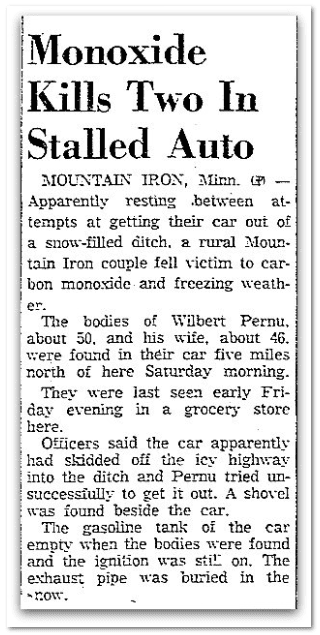I recently received an email from some GenealogyBank users, asking why they couldn’t find any newspaper articles about a tragic death that occurred in 1956:
“We are having trouble finding information about a couple of deaths in our area. A couple, Wilbert Arvo Pernu and Dagmar Charlotte Bolborg Pernu, died by asphyxiation on 8 December 1956 in St. Louis County, Minnesota. Dagmar’s third name is sometimes spelled Valborg. Her maiden name was Sather. She went by ‘June.’ We would like to find a newspaper article, if there was one. Can you help?”
They knew the full names of the deceased and the general facts of the fatal tragedy, including when and where it happened. Why were they having trouble getting results for their newspaper archives searches?
When searching through 1.4 billion newspaper articles, it can sometimes be difficult to get results matching your search terms because you never know how much information the newspapers included about your target ancestor in their articles. What names did they use? What key terms?
For best results, you want to look for the most unique information to use as your search terms.
In this example it is the couple’s surname “Pernu” and the fact that they died in December 1956.
I began the search with just those two clues, putting Pernu in the surname box and December 1956 in the date box on the search form.
That generated two possible matching news articles. One of the results was the article they needed.

If this old news article about the tragedy was so easy to find, why did the email writers have such trouble finding it?
It was probably because they were typing in too much information in GenealogyBank’s search boxes.
There is a natural tendency to want to narrow our search results by typing in all of the information that we have about our target ancestor or the circumstances around an event.
But quite often: less is more.
Resist that desire to be very specific in your searches—try your initial searches using unique, minimal information.
Here are some of the reasons why, in this instance, a more specific newspapers archive search would not return the desired article about the tragic accident:
- The newspaper article did not include Wilbert Pernu’s middle name. If we had included it in our search, the results would not have found this article.
- If we had included the name of the wife (Dagmar Charlotte Bolborg Pernu), her maiden name (Slather), or that she went by the name “June,” then we also would not have found this article. Why? Because she was not named in the article; it simply referred to “Wilbert Pernu…and his wife.”
- Notice that they were tragically killed in Minnesota—but the article describing the events appeared in a South Dakota newspaper. If we had limited the search to only Minnesota newspapers we would not have found this article.
- I limited the search to the month and year (December 1956) and not to a specific date.
Genealogy Search Tip: Focus your search on the surname, especially when it is a distinctive surname. Use a wide date range, such as a year, and do not limit your search to a specific date. If you find that this search produces too many or too few search results, then you can narrow or expand your search until you find your target articles.
